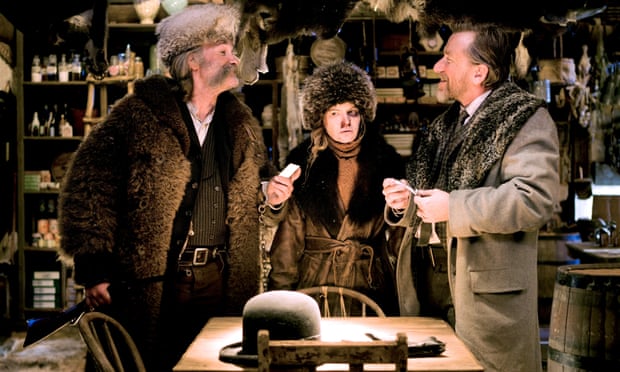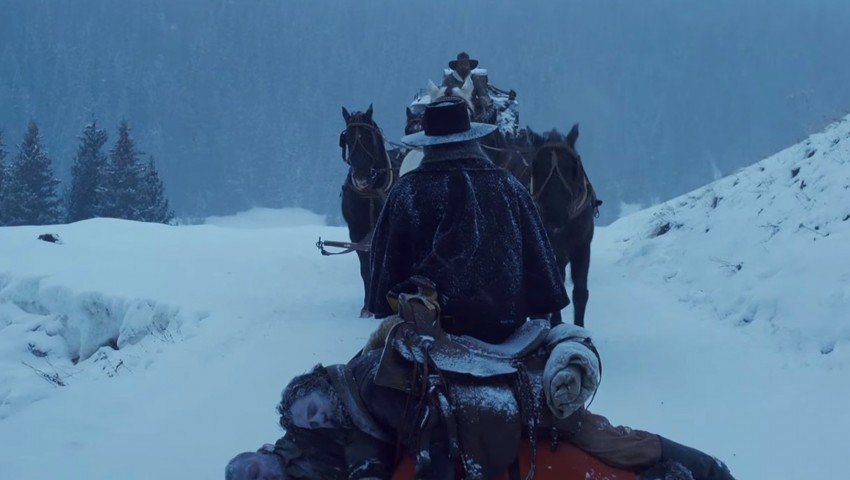Reviewing The Hateful 8
By: Dominique Miller
Exciting premise with gorgeous cinematography...
(Credit: architecturaldigest.com)
Boring movie which takes place mainly in one room and has little to no plot movement...
(Credit: The Guardian)
My sick day movie today was The Hateful Eight. I've been meaning to watch and review this movie for some time now. But take heed, dear readers, because although I am a big Tarantino fan, I am about to be quite blasphemous. So far, this has been the only Tarantino movie that I do not like. It bored the shit out of me. Possibly literally.
The Hateful 8 has been possibly the most boring, pointless, predictable movie that ever manifested itself from the mind of such a genius filmmaker. The premise itself is ridiculous and not in the usual fun, somehow simultaneously deep and lighthearted way that the majority of past Tarantino movies have had. But this one is truly bad...eight people stuck in a house while a blizzard rages outside?? Really?? If anyone wanted to see someone lose their mind during a blizzard, they could've come up to Door County with me this past weekend and watched me go stir crazy in my condo while it snowed profusely outside. It probably would've been more entertaining and it certainly would've seemed a shorter affair than this three plus hour anchor drag of a movie.
The Hateful 8 utilized what would otherwise seem impressive 70mm cameras, being toted by equally impressive and talented camera men and women. It also, unfortunately in this case, utilized Tarantino's meandering story telling style, which is usually also...well...impressive, but which was unfortunately unswervingly dull in this particular instance. His normally engaging way of making sure that the engine and the caboose of a story connect somewhere in the middle fell messily apart every time this story time engine took even the slowest of curves on its long, long track. Though well known and loved, Tarantino's signature style was used in about the worst and most heavy handed way imaginable. Although tedious at times, the plentiful, heavy symbolism employed by so many Tarantino films was certainly appropriate because this movie truly was a never ending blizzard. How can such heavy, weather related symbolism be so drab, you ask?
(Credit: thecodeiszeke.com)
Let's explore. For starters, the very first instance of symbolism within this movie; that of a stagecoach winding its way-meandering-slowly, tediously through a mountain pass during a blizzard. Unlike similar imagery contained within the entertaining and poignant Django Unchained, this imagery is perfectly indicative of the lack of excitement to come in The Hateful 8.
Now, although this movie is quite boring, we can't attribute that entire state of affairs to the fact that it took place largely in one room. Resovoir Dogs also took place largely in one room and Resovoir Dogs was brilliant. Could it be that Tarantino was attempting to recreate some of this brilliance with The Hateful 8?
But I digress. Let's talk some more about the beautiful symbolism present throughout some of his greatest works. Inglorious Basterds and Django Unchained were deeply symbolic, deeply moving works in many ways. Inglorious Basterds was rife with symbolism and metaphor, both ugly and beautiful. The startling changes from one to the other keep the audience on the edges of our seats and glued to the screen throughout.
(Credit: Pinterest)
The beauty of the milk lovingly poured from milking pail to glass at the LaPadite farmhouse suggests an innocence-an innocent time, an innocence of heart and mind of the hardworking people of Europe who had the misfortune of being invaded by the Third Reich.
(Credit: ankitasheth.wordpress.com)
This innocence is of course contrasted by the gleaming black jackboots of the Nazi soldiers, the perfectly placed hat on Col. Hans Landa's head. This type of dichotomy is present throughout the entire movie and is part of what makes it so great. All of Quentin Tarantino's movies are filled with
this sort of multilevel storytelling. Hell, even the symbolism in the Grindhouse double feature was full of this multilayered, deep, yet refreshingly exciting and fun writing, directing, acting, and cinematic style. Everything from the camera work to the acting is extremely well controlled and specific. That has always been a hallmark of Tarantino movies.
Much of that was certainly present in The Hateful 8, so why then was The Hateful 8 such a disappointment? Now, it's worth noting that to most filmmakers, The Hateful 8 would likely have been an unbridled success far beyond their wildest imaginings. However, Tarantino has set a very high bar for himself as a filmmaker and when he fails to meet his own standards, it does not go unnoticed.
There is a sense throughout the entirety of The Hateful 8 of laziness. Tarantino's normally intelligent, imminently quotable, too-cool-for-school, dialogue is empty trite and rote, his story telling tired.
Usually Tarantino finds some great stops and entertaining, yet pertinent diversions along the way during his long trip from the beginning to the end of a story, but this time, although the story certainly was long and meandering and rife with symbolism, it wasn't interesting. Even the symbolism itself seemed obvious, stale and rote--devoid of color.
Unlike in many of Tarantino's movies, Inglourious Basterds of course being one of them, Tarantino's characters seem to beg for redemption. In fact, we, the viewers, root for this redemption. I defy you not to root for Frederick Zoller to come to his senses even up until his very last moment in Inglourious Basterds. I defy you not to want with all your heart for Shoshanna not to kill him, not to kill her lover Marcel and not to kill herself. The characters in The Hateful 8 are much more one dimensional. I didn't root for even one of them to do anything but stop talking, but even when they did that I wasn't satisfied. One thing and one thing only ever interrupted the excuciating level of exposition in this movie--the death of a character. But far from the meaningful death scenes that even the most meaningless characters inhabiting Tarantino's brutal and violent worlds receive, these characters simply died. There was no meaning. There was no symbolism-at least none that made any sense. The characters were irredeemable and the tone and dialogue was tedious. I truly can't decide if this was a purposeful tone that was carefully set or a simple lack of good writing. Surely, there are better ways of accomplishing the telling of a meaningful story.
Though Tarantino is a master at telling great stories of all kinds-pointless and poignant alike-his best works are often an odd mix of both, this story seems truly pointless. The redeeming qualities present in even the silliest Tarantino movies are almost entirely lacking here.
So what was this story about? I don't mean the obvious plot lines. I mean the underlying point--that deeper level of meaning that plays such a major part in most of his films. I believe this movie was meant in part to illustrate the pointless nature of some of the post-civil war in fighting. I believe he meant to discuss the ramifications of the civil war on society and to illustrate the uglier side of the era of reconstruction. However, the way he went about it was ham-handed at best, especially by his own standards. The acting was fine. I do not however think that this movie was cast nearly as well as some of my favorite Tarantino films. I realize that Quentin Tarantino has made somewhat of a career of pulling beautiful performances from forgive, but...shall we say...not the best actors...? He has plucked actors from the depths of obscurity to place them squarely in the limelight once again, and in that respect, he has succeeded at least in one such attempt this time around: with Jennifer Jason Leigh. She was the consummate embodiment of said proclivity at least in this particular film. Jennifer Jason Leigh was brilliant. She carried even the scenes where she was only a background character. She was quite literally the star of the scenes containing dialogue between other actors even though her only function was to quietly play piano in the background. That takes direction and that takes talent, so I will say that he succeeded on that front and so did she. I certainly can't give him all of the credit. She really delivered a stellar performance. Tim Roth was quite good as well. Aside from the great performances from these two actors, however, I fear he has failed in his latest attempt to revamp tired acting careers (not that either of these actors are tired, they simply fit his known formula of plucking previously used and/or previously famous actors and placing them squarely back on their shiny pedestals). I loved the hilariously adorable cameo by Channing Tatum. The look on his character's face before he dies just about makes the entire movie and it's so Tarantino. Tatum and Jennifer Jason Leigh had such chemistry even in that one scene! Wow!
Unfortunately a lot of the character's motivations don't make a lot of sense and consequently, neither do the writers' or director's. Could that be the message? That racism and the civil war were senseless? Possibly...I guess...but there are certainly more graceful and less ham-handed ways of telling this tale and driving this point home. I for one say we give Quentin Tarantino about a dozen more chances to prove how awesome he is though. Let's reboot the system. Let's breathe some fresh air back into our favorite movie making machine. If I had my way, I would suggest that he start with another team-up with Robert Rodriguez...but what do I know, right? I only critique movies. I can't wait to see some of your comments and have this discussion!




No comments:
Post a Comment